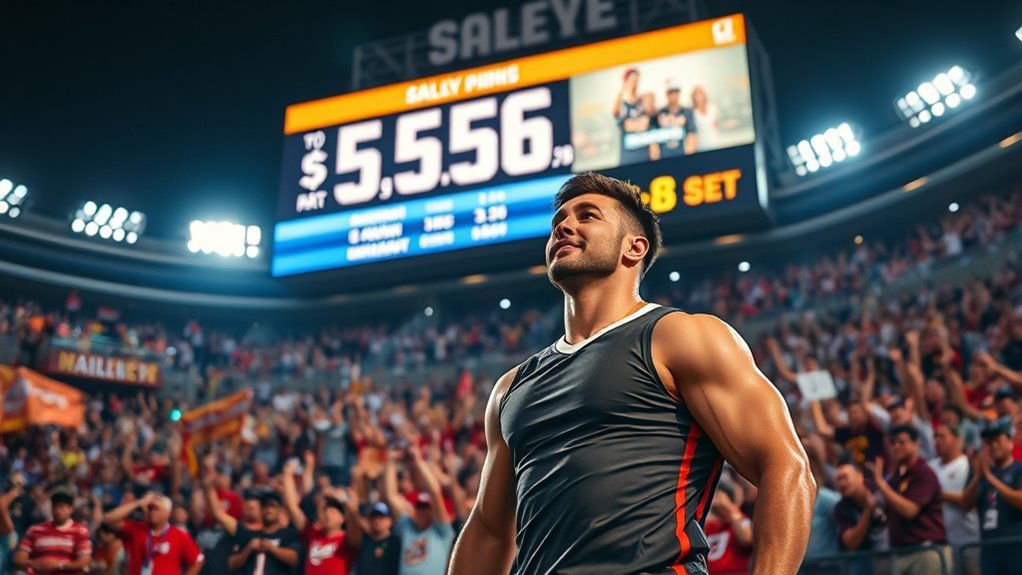Athletes are paid so much because their unique skills and talent generate high market demand. Fans boost revenue through ticket sales and merchandise, while sponsorships and media rights bring in huge profits. Plus, with their careers often being short-lived, athletes need to maximize earnings quickly. Their physical and mental demands require rigorous training, further enhancing their value. If you’re curious about the various factors at play in this lucrative industry, there’s much more to explore.
The Economics of Professional Sports
The business of professional sports is a complex ecosystem where revenue, expenses, and player salaries intertwine. Understanding the economics of this domain reveals how labor market dynamics shape athlete valuation and salary structures. Economic factors, like television deals and sponsorships, directly impact financial dynamics, driving wage disparities among players. The influence of market forces can create significant gaps in earnings, depending on the sport and its popularity. While some athletes command staggering salaries, others struggle to receive fair compensation. These disparities stem from varying audience engagement and the unique demands of each sport. Steering through sports economics helps you appreciate how athletes’ earnings reflect not just talent, but the broader financial landscape that governs their careers. Furthermore, big data analytics offers teams insights into player performance and market value, influencing contract negotiations and salary determinations.
Market Demand and Fan Engagement
Market demand and fan engagement play a pivotal role in shaping athletes’ salaries within the professional sports landscape. When you think about fan loyalty and market saturation, it’s clear that teams must cater to diverse audience demographics. High ticket pricing and merchandise sales reflect this demand, while social media engagement amplifies athletes’ reach.
| Factor | Impact on Salaries |
|---|---|
| Fan Loyalty | Increases revenue streams |
| Event Attendance | Boosts sponsorship potential |
| Youth Participation | Guarantees future fan base |
| Global Reach | Expands market opportunities |
As fans engage more, brand loyalty grows, driving demand for athletes. Your participation in this ecosystem fuels their earnings, allowing them the freedom to excel. Additionally, the ability of athletes to handle stress and pressure contributes significantly to their performance, further enhancing their marketability and appeal.
Revenue Generation Through Sponsorships
When you think about athletes’ earnings, sponsorships play a huge role in their financial success. Brand partnerships can considerably boost an athlete’s income, while media exposure often drives these lucrative deals. It’s clear that endorsement contracts not only enhance their market value but also shape the entire sports landscape.
Brand Partnerships Impact Earnings
While many athletes earn substantial salaries through their contracts, brand partnerships greatly enhance their overall earnings. These collaborations capitalize on their celebrity status and foster brand loyalty among fans. When you think about it, athletes become walking advertisements, influencing purchasing decisions and driving sales for companies. Here are some ways brand partnerships impact their earnings:
- Endorsements: Big brands pay athletes to promote their products.
- Merchandise: Athletes often have signature lines that boost sales.
- Social Media: Sponsored posts can bring in hefty payouts.
- Event Appearances: Athletes earn money by participating in promotional events.
- Collaborative Campaigns: Joint marketing efforts can elevate both athlete and brand visibility.
Ultimately, these partnerships transform athletes into powerful business entities.
Media Exposure Drives Revenue
Athletes not only leverage brand partnerships but also benefit considerably from media exposure, which is essential for revenue generation through sponsorships. The more media reach an athlete has, the more appealing they become to brands looking to boost their visibility. With millions tuning in to watch games and events, athletes create lucrative revenue streams that attract sponsors keen to connect with fans. When athletes are featured in commercials or social media campaigns, it amplifies their marketability and enhances brand recognition. This symbiotic relationship fuels both the athletes’ earnings and the brands’ growth, creating a powerful cycle of influence. By tapping into their media presence, athletes can harness the freedom to pursue diverse opportunities, ultimately leading to greater financial rewards.
Endorsement Deals Influence Value
As endorsement deals become a cornerstone of an athlete’s income, their value in the marketplace greatly rises. In today’s celebrity culture, athletes aren’t just competitors; they’re powerful brands. Companies leverage their image rights through intricate sponsorship negotiations, enhancing marketing strategies that resonate with fans. This dynamic influences brand loyalty, as fans often align with their favorite athletes.
- Endorsement contracts can earn athletes millions.
- Promotional campaigns amplify athlete influence.
- Market saturation can dilute individual athlete value.
- Strong athlete images attract premium sponsors.
- Success hinges on effective marketing strategies.
Ultimately, endorsement deals not only boost an athlete’s income but also shape how they’re perceived in the market, making them invaluable assets in the domain of sports marketing.
Unique Skill Sets and Training Regimens
When you think about athletes, it’s clear their unique skill sets and intense training regimens set them apart. These specialized abilities, often rare and highly refined, require immense dedication under competitive pressure. Understanding what goes into their training can shed light on why they command such high salaries. For instance, many athletes incorporate explosive power training to enhance their performance, demonstrating the level of commitment to their craft.
Specialized Athletic Training
Specialized athletic training is essential for developing the unique skill sets and regimens that elite athletes rely on to excel in their sports. It’s not just about physical prowess; it’s a holistic approach that combines various elements to guarantee peak performance and longevity.
- Elite coaching focuses on tailored training methods.
- Performance analytics helps track improvement and refine techniques.
- Injury prevention strategies keep athletes on the field.
- Nutrition strategies fuel their bodies for best output.
- Psychological training builds mental toughness for high-pressure situations.
Rare Physical Abilities
Athletes often showcase rare physical abilities that set them apart from the competition, and these skills are honed through unique training regimens. Their genetic advantages blend with unmatched discipline requirements, allowing them to reach performance peaks others can only dream of. With a commitment to training dedication, they develop exceptional physical prowess and mental toughness, ensuring injury resilience and athletic longevity.
| Skill Set | Training Focus | Unique Gifts |
|---|---|---|
| Speed & Agility | Sprint drills | Fast-twitch fibers |
| Strength | Weightlifting | Natural power |
| Endurance | Long-distance runs | Aerobic capacity |
| Flexibility | Stretching routines | Elasticity |
| Coordination | Skill drills | Hand-eye coordination |
This competitive spirit is what elevates them, making their remarkable abilities truly enchanting.
Intense Competitive Pressure
While the thrill of competition drives athletes to push their limits, the intense pressure they face can be overwhelming. To thrive in such an environment, athletes must master pressure management and cultivate mental resilience. This isn’t just about physical prowess; it’s about maintaining focus when everything’s on the line.
- Developing effective coping strategies
- Embracing mindfulness and meditation
- Seeking support from coaches and peers
- Setting realistic goals to reduce stress
- Learning from setbacks to build strength
These skills help athletes navigate the highs and lows of their careers, allowing them to perform at their best despite the demands. Ultimately, their ability to manage pressure justifies the exceptional salaries they earn.
The Role of Television and Media Rights
As sports fans tune in to their favorite games, the influence of television and media rights becomes increasingly apparent in shaping athletes’ salaries. Major leagues negotiate hefty television contracts that generate billions in revenue, allowing teams to invest more in talent. This media exposure not only boosts the sport’s popularity but also creates a lucrative ecosystem where athletes are viewed as stars. The more fans watch, the higher the ratings, which leads to increased advertising dollars. In this sense, athletes aren’t just players; they’re brands that thrive on visibility. As the demand for content grows, so do their paychecks, reflecting their essential role in this multi-billion-dollar industry. It’s a cycle of opportunity, driven by the powerful connection between sports and media.
The Impact of Social Media on Athlete Brands
Social media’s transformed how athletes connect with fans and promote their brands. With platforms like Instagram and Twitter, you can boost your visibility and engage directly with followers, making you more appealing to sponsors. As a result, opportunities for endorsements and partnerships have skyrocketed for those who effectively leverage their online presence.
Brand Visibility and Engagement
With the rise of platforms like Instagram and Twitter, athletes now have unprecedented opportunities to enhance their brand visibility and engage directly with fans. Social media allows you to connect on a personal level, fostering brand loyalty and turning athletes into powerful influencers. By understanding fan demographics, they can tailor content that resonates, driving merchandise sales and increasing audience engagement.
- Athlete branding thrives with authentic interactions.
- Social media boosts visibility amidst market saturation.
- Fans become brand ambassadors through shared experiences.
- Event sponsorships are amplified via social channels.
- Engaging content can lead to lucrative partnerships.
In this digital age, athletes wield significant power, shaping their narratives and cultivating their brands like never before.
Sponsorship and Endorsement Opportunities
While athletes have always sought sponsorships and endorsements, the rise of social media has transformed these opportunities into a more dynamic and interactive experience. You can see how platforms like Instagram and Twitter allow athletes to connect directly with fans and brands. This personal interaction makes athlete endorsements more valuable than ever, as brands want to tap into that direct connection. Sponsorship deals now often include social media campaigns where athletes can showcase products authentically to their followers. The freedom to engage and build their own brand gives athletes more leverage in negotiations, leading to lucrative partnerships. It’s a new era where an athlete’s online presence can markedly impact their earning potential and overall brand success.
The Short Career Span of Athletes
Although many dream of a career in sports, the reality is that athletes often face a surprisingly short window of opportunity to excel. On average, a professional athlete’s career lasts only a few years, making financial planning essential. Here are some reasons why this short career span matters:
- Injuries can cut careers short.
- Competitive pressure can lead to early burnout.
- Age-related decline affects performance.
- Shifting to a post-sports life can be challenging.
- Contract negotiations may be unpredictable.
Given these factors, athletes need to capitalize on their earnings quickly and plan for their futures wisely. Understanding the brevity of their careers can help them make informed decisions and embrace freedom beyond the field.
Comparisons to Other High-Paid Professions
Athletes face a unique challenge with their short careers, which often leads to a stark comparison with other high-paid professions. When you look at salary comparisons, it’s clear that professional athletes earn hefty sums, but their window for success is limited. Unlike doctors or lawyers who can build long-lasting careers, athletes typically peak in their 20s or early 30s. This urgency drives their high salaries, as they must maximize earnings in a brief timeframe. While you might find CEOs or tech moguls raking in millions, their careers often span decades. So, while athletes’ paychecks seem excessive, they reflect a reality where every game could be their last, making their financial rewards both justifiable and necessary for their future freedom.
Cultural Significance of Sports in Society
Sports hold a unique place in society, often serving as a powerful unifier that transcends cultural and socioeconomic barriers. They shape our sports identity and foster community pride, creating cultural rituals that bond us together. Engaging in sports promotes social cohesion, bridging gaps between diverse groups. Their economic impact is undeniable, driving local economies and creating jobs, while also providing opportunities for youth engagement.
- Sports as a form of nationalism expression
- Building global connections through international events
- Fostering lifelong friendships and networks
- Encouraging healthy lifestyles and mental well-being
- Celebrating achievements that inspire future generations
In this way, sports become more than just games; they’re an essential part of our shared human experience. Moreover, participating in sports can significantly enhance mental toughness, equipping individuals with resilience and focus that extend beyond the playing field.
The Influence of Team Performance and Success
Success on the field or court can greatly impact a team’s financial standing and the salaries of its players. When a team’s performance metrics soar, it not only boosts ticket sales but also increases merchandise revenue and sponsorship deals. You can see how team dynamics play a vital role; a winning squad attracts fans, creating a loyal following that fuels financial growth. On the flip side, poor performance can lead to dwindling income and lower player salaries. In this high-stakes environment, players’ earnings often reflect their contributions to the team’s success. Additionally, building endurance is crucial for athletes, as it enhances their performance and helps secure victories. So, when you’re cheering for your favorite team, remember that their victories directly influence the financial freedom athletes can enjoy. Success isn’t just sweet—it’s profitable.
Frequently Asked Questions
How Do Athletes’ Salaries Compare to Those in Other Entertainment Industries?
Athletes’ salaries often surpass those in other entertainment industries, reflecting their immense marketability and the revenue they generate. While movie stars and musicians might earn substantial entertainment earnings, top athletes can command even higher figures, especially with endorsements. You’ll notice salary comparisons reveal that elite athletes enjoy unique contracts fueled by fan engagement and media rights, highlighting their pivotal role in the sports industry. It’s a fascinating dynamic that showcases their undeniable value.
What Impact Do Injuries Have on an Athlete’s Earning Potential?
Injuries can seriously impact your earning potential as an athlete. When you face injuries, it affects not just your performance but also your ability to negotiate contracts. Focusing on injury prevention can enhance your career longevity, allowing you to play longer and maximize earnings. Staying healthy means you can continue to showcase your skills, attract endorsements, and secure better deals, ultimately giving you the freedom to thrive in your sport without financial worries.
Are Female Athletes Paid Less Than Male Athletes in Similar Sports?
Yes, female athletes often get paid less than male athletes in similar sports, highlighting ongoing gender pay disparities. This inequality reflects broader issues in sports equity, where women’s accomplishments aren’t always valued the same way. You might feel frustrated seeing talented female athletes struggle for fair pay, especially when their male counterparts earn considerably more. Advocating for equal opportunities and pay can help guarantee that everyone gets the recognition and compensation they deserve.
How Do Endorsements Influence an Athlete’s Overall Income?
Endorsements can considerably boost an athlete’s income; in fact, nearly 20% of top athletes’ earnings come from brand partnerships. When you consider market demand, companies often pay premium rates to align with popular athletes, leveraging their influence to reach wider audiences. This synergy not only enhances your earning potential but also empowers you to choose partnerships that resonate with your values, allowing you to enjoy both financial freedom and personal fulfillment.
What Role Do Agents Play in Negotiating Athlete Salaries?
Agents play an essential role in negotiating athlete salaries. They leverage their expertise and connections to guarantee you get the best possible deal through contract negotiation. With their understanding of market trends and team budgets, agents can greatly influence your earnings, helping you navigate complex terms and securing bonuses. By advocating for your interests, they give you the freedom to focus on your performance while making sure you’re compensated fairly for your talents.




